|
|
|
Sort Order |
|
|
|
Items / Page
|
|
|
|
|
|
|
| Srl | Item |
| 1 |
ID:
169050


|
|
|
|
|
| Summary/Abstract |
Financial literacy is defined as the knowledge, skills, and ability to navigate increasingly complex financial markets, and is considered to empower consumers to make responsible financial decisions. It has been widely promoted as a crucial life skill following the 2008 financial crisis. This study critically analyzes financial literacy education initiatives in Turkey through ethnographic research. Financial literacy curricula provide the basic knowledge of finance as well as instruct subjects ways to conduct financial planning, budgeting, debt management, creditworthiness, saving, and investment. Financial literacy agenda deepens neo-liberal governmentality by promoting an entrepreneurial subjectivity and making individuals more aware and responsible for social risks. The cultural political economy perspective of this study analyzes financialized capital accumulation dynamics together with the reshaping of culture and the constitution of financialized subjectivities.
|
|
|
|
|
|
|
|
|
|
|
|
|
|
|
|
| 2 |
ID:
169054
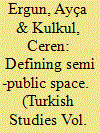

|
|
|
|
|
| Summary/Abstract |
Urban space is accepted as an inextricable part of public life. It is assumed that the upper-middle class has been sequestering itself from the rest of society by living in enclosed and private spaces. This intentional disengagement from public life and public spaces has been studied by the literature on gated communities. This article operationalizes the gated community beyond the debate on social segregation and includes it in the discussion of the use, production and transformation of urban spaces along with the isolation, privatization, and idealization of a specific place. This study departs from the understanding that the gated community is simply a new form of social segregation. Instead, it acknowledges enclosed residential areas as semi-public spaces in which attributes of public and private spaces are merged.
|
|
|
|
|
|
|
|
|
|
|
|
|
|
|
|
| 3 |
ID:
169051
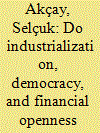

|
|
|
|
|
| Summary/Abstract |
This study aims to unweil the determinants of financial development, particularly the impact of industrialization, democracy, and financial openness on financial development in Turkey over the 1975–2015 period, using a bounds testing approach. It is found that (i) financial development and its main determinants are co-integrated; (ii) democracy is positively associated with financial development, whereas financial openness is associated with lower financial development; and (iii) industrialization is not a significant determinant of financial development in Turkey. Based on the obtained results, some recommendations are also provided.
|
|
|
|
|
|
|
|
|
|
|
|
|
|
|
|
| 4 |
ID:
169049
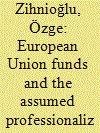

|
|
|
|
|
| Summary/Abstract |
The professionalization effect of foreign funding is one of the prominent issues in the critical literature on donor/recipient relations. Despite growing attention on this topic, the link between European Union (EU) funding to Turkish civil society organizations (CSOs) and their professionalization remain understudied. This article fills this gap. Drawing on an original set of interviews with leaders of 45 CSOs in Turkey, this article finds that EU-funded projects have not led to the professionalization of Turkish CSOs. This article suggests several reasons for this and also discusses the broader impact of EU funds in relation to CSO’s professionalization.
|
|
|
|
|
|
|
|
|
|
|
|
|
|
|
|
| 5 |
ID:
169055
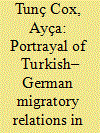

|
|
|
|
|
| Summary/Abstract |
Popular imagination of an age-old and very common phenomenon – migration – depends on images and stories in circulation. Mediated images of migration, refugees and diasporas play an important role in ethnic and cultural identification processes. This article explores how Turkey has accounted for its own diasporic subjects through cinematic narratives. Focusing on two salient Turkish examples from the 1980s that contradict the dominant narrative tendencies in Turkish–German/German films of the time, this article aims to present a fresh outlook. It strives to explore how these films question stereotypes and problematize essentialist readings of Turkishness and nationhood via a descriptive-interpretive analysis.
|
|
|
|
|
|
|
|
|
|
|
|
|
|
|
|
| 6 |
ID:
169053
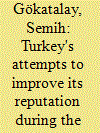

|
|
|
|
|
| Summary/Abstract |
Making use of archival material and newspapers, this article argues that Turkish concerns over reputation played a central role for Turkey in the making of the post-War Turkish-American rapprochement. Both government and opposition parties in Turkey as well as Turkish journalists, diplomats and students who were studying in the United States waged a campaign to make Turkey appear to be a reputable, modern, and civilized ally of the United States. Establishing an information bureau in New York, trying to prevent the exhibition of American movies that misrepresented Turkey and gladly hosting American journalists who visited Turkey, Turkish authorities tried to give the message that Turkey was under the Soviet threat and deserved to be included in the Marshall Plan.
|
|
|
|
|
|
|
|
|
|
|
|
|
|
|
|
| 7 |
ID:
169052
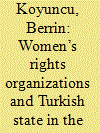

|
|
|
|
|
| Summary/Abstract |
In this article, we aim to explore the shift in the relationship between the state and women’s rights organizations (WROs) in Turkey in the post-2011 period, which was evinced in rising tensions between gender equality and gender complementarity discourses. We argue that, in the process of the vernacularization of global and/or international gender norms in Turkey, the conservative gender policy of the government corresponded to the endorsement of ‘gender justice,’ a particularistic approach formulated with reference to Islam. As such, the vernacularization of universal gender norms opened the way for the state in Turkey to solidify its legitimacy by instrumentalizing social divisions, marginalizing opposition WROs, and aligning with government-oriented organizations.
|
|
|
|
|
|
|
|
|
|
|
|
|
|
|
|
|
|
|
|
|